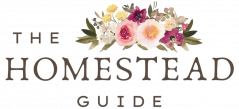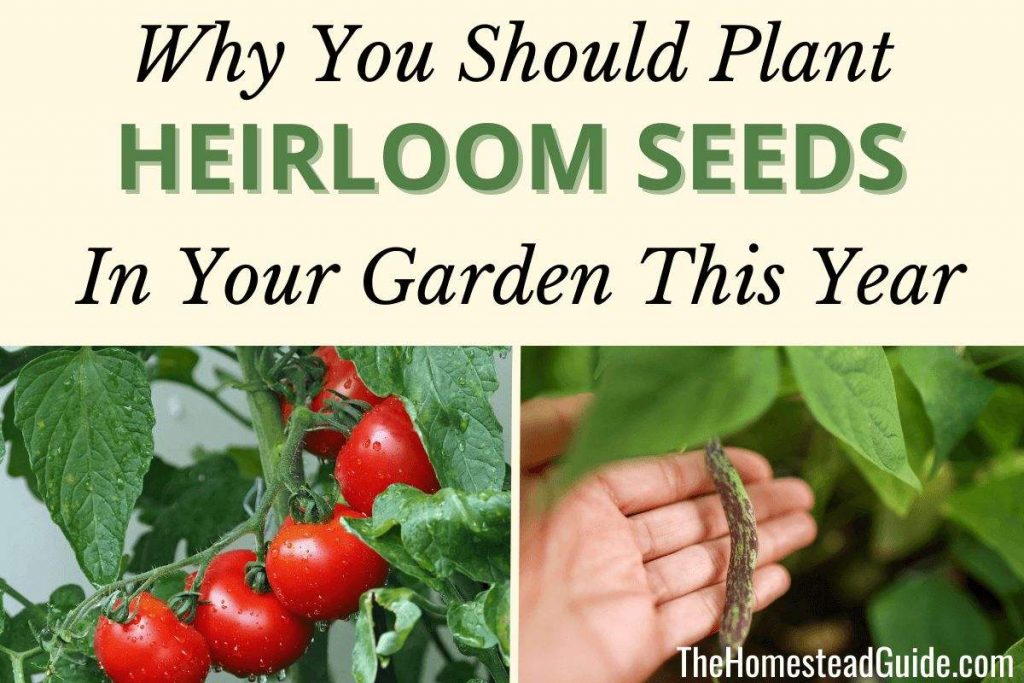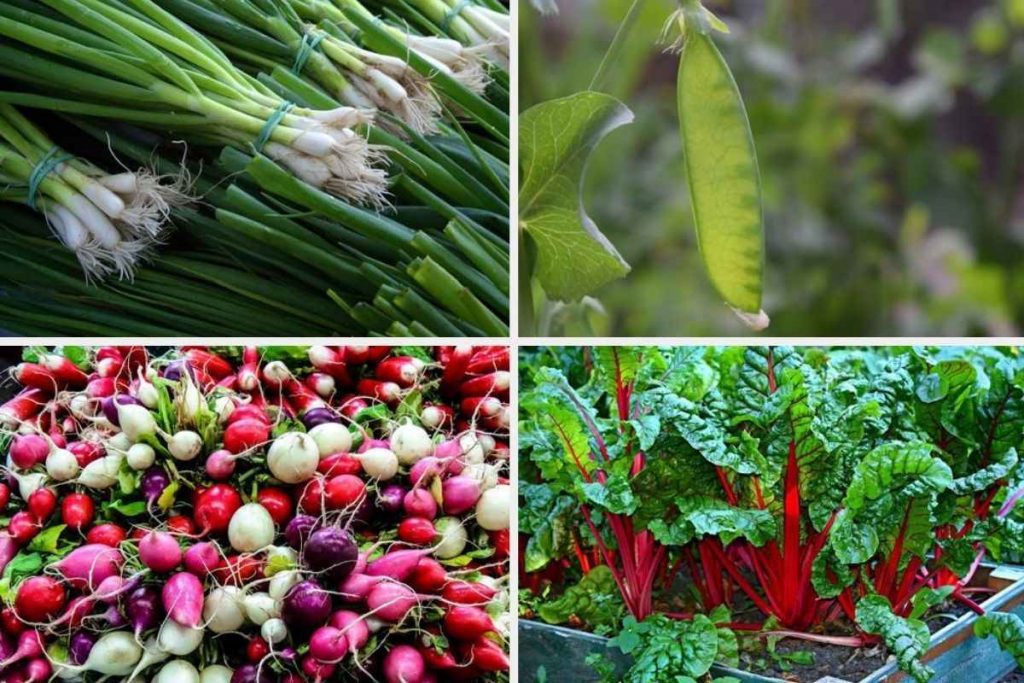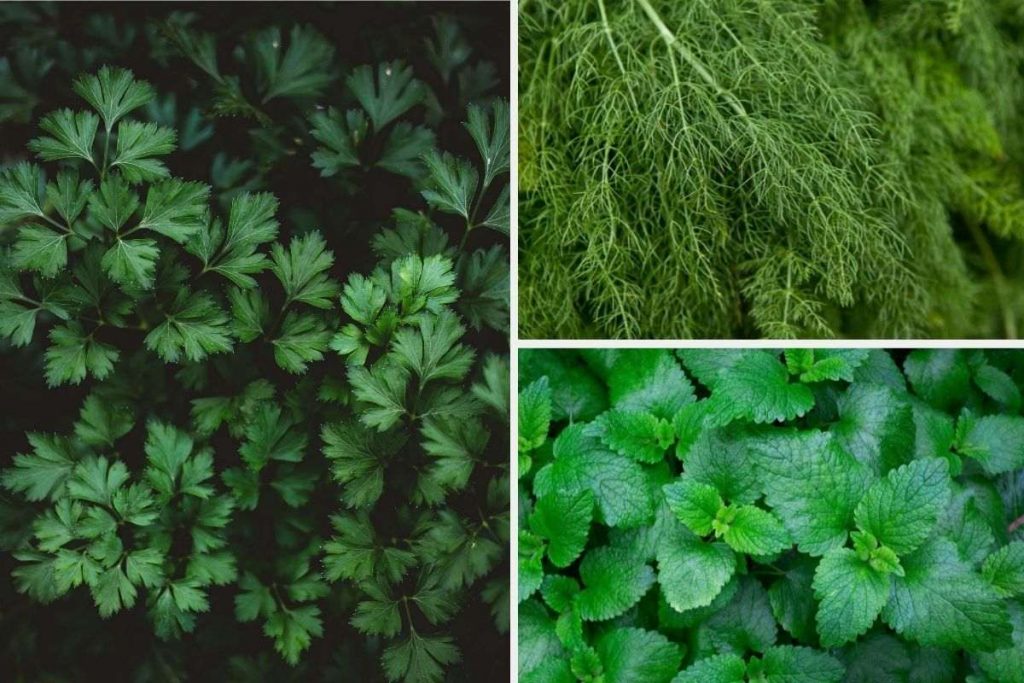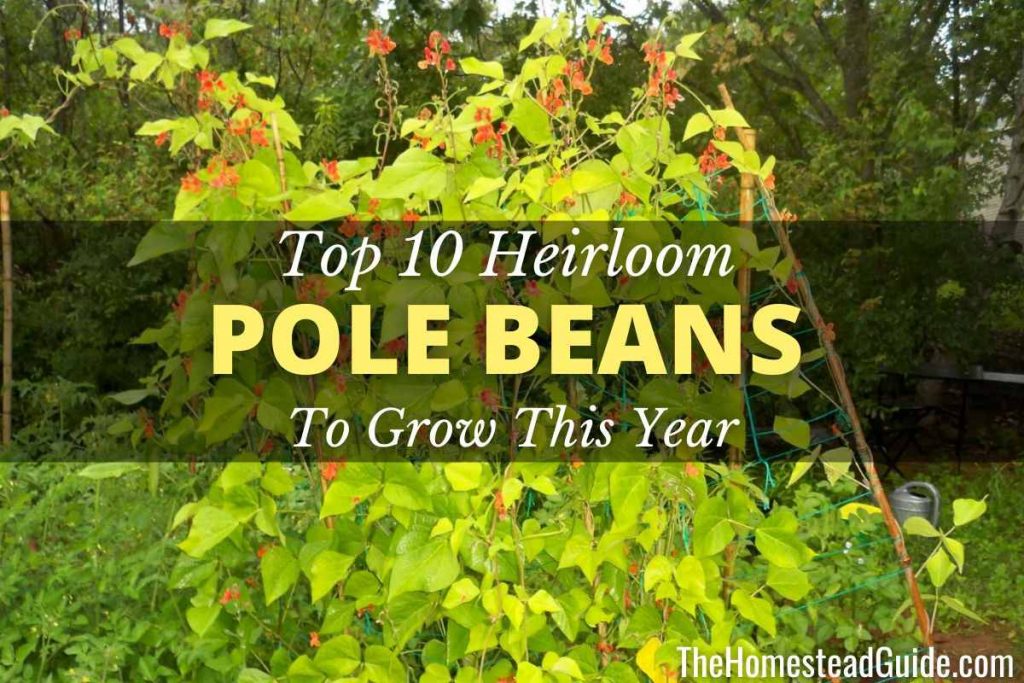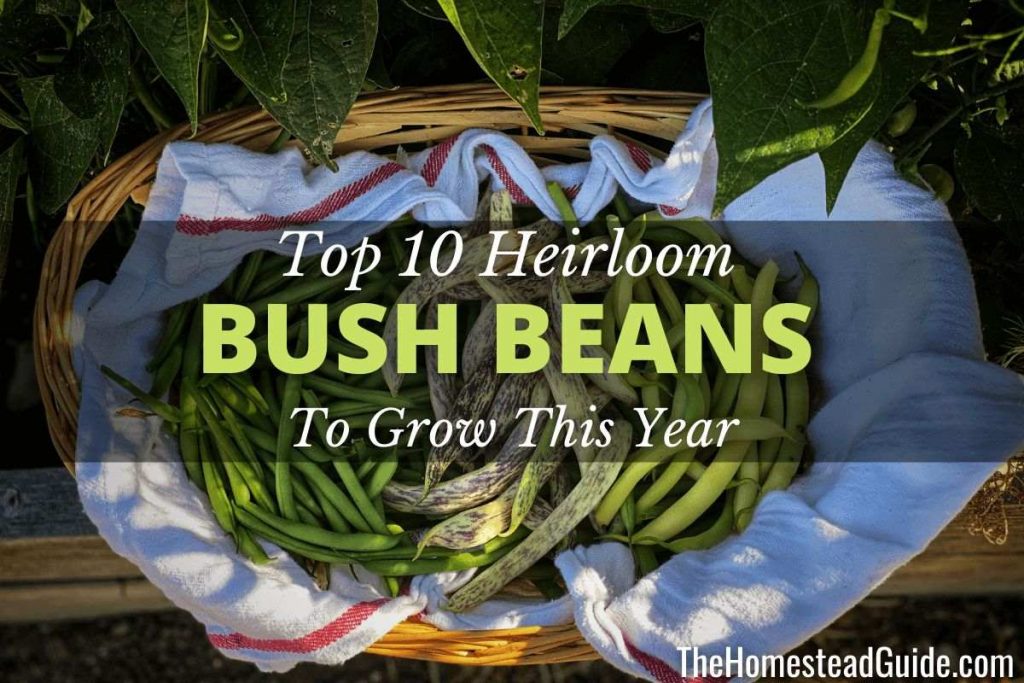Are you planning out your garden for the year and are considering planting some heirloom seeds? If so, you’re probably wondering, ‘Are heirloom seeds better?’
If you’re considering whether to plant heirloom seeds vs. hybrid seeds, there is no universal yes or no answer. Each has its pros and cons relating to flavor, history, seed saving, disease and pest resistance, and more. With that being said, as a homesteader and organic gardener, I always prefer to plant heirloom seeds over hybrid whenever I can, and I will tell you all about it in this post.
Now, you might have heard the word “heirloom” mentioned before. Maybe you heard it when your mother or grandmother was telling you about their favorite garden vegetables. That would make sense, because heirloom seeds are those that have been passed down from generation to generation over decades, and they offer rich, unique flavors that can’t be found in commercially grown produce.
As homesteaders, our goal is to be as self-sufficient as possible. Growing heirloom seeds is an excellent and extremely important – if not required – part of being a successful homesteader. In this post, I will go over what are heirloom seeds, why you should grow heirloom plants (and why I think heirloom seeds are better), and where to get heirloom seeds.
What are heirloom seeds and why are they important?
Heirloom seeds come from a long line of true-to-type, open-pollinated plant varieties that have been passed down over many generations for 50 years or more. Open-pollinated plants are those which have been pollinated by natural means such as birds, pollinators and wind. For a better idea of the differences between open-pollinated, heirloom, hybrid and GMO seeds, check out our Complete Guide to Organic Gardening.
Heirloom plants are genetically pure, meaning they have not been crossbred with other varieties. This is significant because it means heirloom plants will grow true to seed, whereas hybrid plants will not. If you’re considering whether you should plant heirloom seeds vs. hybrid seeds and you want to save your seeds to plant next year, you should stick to heirloom or open-pollinated varieties. You’ll see the designation on the seed packet or in the description of the seed variety if you’re looking online.
For gardeners who value plant diversity, heirloom seeds are a great way to grow unique varieties of plants that have stood the test of time.
Most importantly, heirloom seeds are an important part of our gardening heritage. They have been passed down from generation to generation and are genetically unchanged from their original parent plants. Heirloom seeds are prized for their ability to produce plants with the same characteristics as the parent plant, making them ideal for gardeners who want to save seeds from their favorite plants.
Heirloom seeds have been passed down through generations and are cherished for their unrelenting quality, historical significance, and oftentimes sentimental and nostalgic reasons. Growing the same tomatoes or cucumbers that your grandparents once grew gives you that connection and keeps the cherished memories alive.
So, are heirloom seeds better? Well, if you ask me, heirloom varieties are an essential part of our gardening heritage and should be preserved for future generations, so we must all do our part to keep these timeless varieties alive in a world where GMOs and new hybrids are constantly being created.
Why You Should Grow Heirloom Plants
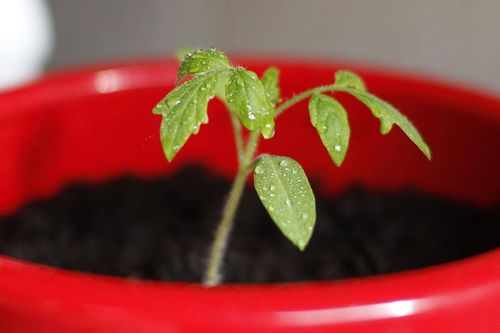
1. Heirloom plants have the best flavors.
Many gardeners say that the flavor of heirloom plants is unmatched. If you’re looking for the best flavor in your garden, heirloom plants are the way to go. Unlike hybrid plants, which are bred for specific traits such as disease resistance or longer shelf life, heirloom plants are kept true to their original form. They haven’t been altered in any way, so they maintain the same flavor that they’ve had for generations.
Heirloom plants are prized for their rich flavor, which can be very different from the more bland taste of the mass-produced fruits and vegetables you find at the grocery store. These grocery store varieties are bred to look “flawless” and have a long shelf life over their flavor. They are picked while they are still unripe so they can ripen over their long transit times from all over the world.
This is a matter of opinion, but you’ll probably find that most people you ask will say they prefer heirloom varieties for this reason. I personally agree with this myself.
2. Heirlooms are packed with nutrients.
Again, this is just a matter of opinion, but many people claim that heirloom plants are more nutritious than hybrids and GMOs. This is because heirloom plants are not bred for shelf life, uniform size or fast production the way industrially grown produce is. Instead, heirloom plants have been selected for flavor, robustness and nutrition.
In fact, there are even studies that show evidence of declining nutrients in some fruit and vegetable varieties, especially when industrial farmers focus on quantity over quality.
Maybe it’s because heirloom plants sometimes grow at a slower pace and mature gradually throughout the growing season. This gives them more time to develop the nutrients as compared to the bland, watery produce you get at the grocery store. I don’t know for sure why, but it is nice way to think about it.
3. There are so many varieties of heirloom plants.
Heirloom plants are prized for their history and genetics as well as their flavor and beauty. There are heirloom varieties of almost every common garden plant, from tomatoes and peppers to squash and beans.
Today, heirloom plants are enjoying a resurgence in popularity as gardeners aim to add interest and diversity to their gardens. With so many wonderful varieties to choose from, it’s easy to see why heirloom plants are such a treasured part of gardening history.
I love discovering all kinds of heirloom plants – the hardest part is picking which ones I want to grow! Fortunately, the seeds are not at all expensive, which leads me to my next point…
4. Heirloom seeds are often less expensive than hybrids.
Many gardeners don’t realize that heirloom seeds can be less expensive than hybrids. Heirloom seeds are those that have been passed down from generation to generation, and they rely on nature for pollination. Hybrid seeds, on the other hand, are created by crossing two different varieties of plants to breed for specific characteristics. While hybrids can be more vigorous and disease resistant than heirlooms, they can be more expensive to produce and you will have to buy new seeds every year.
On the other hand, heirloom seeds can be saved and replanted from one season to the next. You will be reduce the overall cost of your gardening operation and contributing to a self-sufficient homesteading lifestyle.
5. You can save the seeds.
In my opinion, this is the number one reason to plant heirloom seeds. The homesteading lifestyle is based on self-sufficiency and having a close connection to the natural environment. That is why I am so passionate about organic gardening and respecting the ecosystem around us.
Growing heirloom plants is sustainable gardening and eco-friendly gardening. If you store your seeds correctly, you won’t have to buy new seeds until you want to try a new variety.
And when it comes to collecting seeds, you’ll have more seeds than you know what to do with: one cherry tomato can contain 50-100 seeds! That’s more than enough for next year’s crops from just one single tomato.
6. When you grow heirloom plants, you are preserving genetic diversity.
Heirloom seeds have been passed down for generations and are prized for their unique genetics. By growing heirloom plants, you are keeping these genetics alive and ensuring that future generations will be able to enjoy them as well. Heirloom plants are also an important source of food security. Some of these varieties have been around for hundreds of years. By growing heirloom plants, you are not only preserving genetic diversity, but you are also playing an important role in the future of food production. After all, hybrids have to come from somewhere.
As monoculture becomes more common, heirloom seeds provide a vital source of genetic material that can be used to develop new varieties of plants. Many people enjoy raising heirloom plants to help make sure older genetic varieties don’t die off due to the increase in modern hybridization.
7. Each variety has a unique backstory, and you are connected to a piece of history.
While browsing the racks of heirloom seeds at your local garden center, you may find yourself wondering about the history behind these unique plants. These seeds are the product of generations of careful breeding and selection, and each variety has its own unique backstory. Unlike hybrid varieties, heirlooms are open-pollinated, meaning that they retain their genetic integrity from one generation to the next. As a result, heirloom seeds can provide a vital link to the past, connecting us with the generations of growers who came before us. Each heirloom variety has its own unique backstory, and by planting them in our gardens, we keep that history alive. In a world where so much is mass-produced and standardized, heirloom plants offer a wonderful sense of connection and diversity.
For example, the famous “Mortgage Lifter” tomato was developed by an enterprising man known as “Radiator Charlie” during the Great Depression years. Charlie paid off his $6,000 mortgage in just six years by selling the giant fruits. That’s pretty amazing in those times!
Where to Buy Heirloom Seeds
1. Online seed stores
You will find many online seed stores selling heirloom seeds. One important piece of advice is to make sure you only buy from well-known, reputable businesses and avoid buying seeds off Amazon or eBay, as a lot of the seeds are knockoffs or outright scams.
Some well-known online seed stores to check out are True Leaf Market in the USA and The Incredible Seed Company in Canada. (Note – I am not affiliated with or incentivized by either one of these companies. I just personally recommend them as high quality seed stores.)
2. Online seed exchanges
There are tons of regional Facebook groups for seed swapping. Just search your area and “seed exchange” or “seed swap” and you’ll likely find a bunch of like-minded people who like to share and swap their seeds!
3. Local seed exchanges
You may find local seed exchanges while you are searching for online groups – that’s even better! At these local seed exchanges, gardeners can meet up and swap seeds with one another.
4. Local farms and homesteads
You can often find heirloom seeds for sale at local farms and homesteads. You might get some important growing tips from these farmers – something extremely valuable to have as a homesteader – and you may hear a cool backstory on how they came to grow these seeds. Who knows, you might even make a new homesteader friend who shares the same lifestyle as you!
5. Botanical gardens and horticultural societies
Heirloom seeds are becoming increasingly popular with home gardeners. Because of this, many local botanical gardens and horticultural societies sell heirloom seeds. These organizations are often able to source heirloom seeds that are not available at commercial nurseries. Heirloom seeds that are sourced locally are also more likely to be well-adapted to the local climate. As a result, heirloom seeds sourced from locals are often a better choice for home gardeners than those that are purchased from online stores.
6. Local garden centers
Local garden centers are a great place to buy heirloom seeds. Whether you’re looking for a specific variety or just want to try something new, heirloom seeds are worth checking out the next time you’re at your local garden center.
When shopping for heirloom seeds, be sure to ask the staff at the garden center for help. They can often give you more information about the history of the seed and how best to grow it.
Final Thoughts
If you’re looking to become more self-sufficient, consider planting heirloom seeds. Heirloom varieties are open-pollinated, meaning the seeds can be saved, so you can enjoy your favorite varieties for years to come. Plus, many heirloom seeds are resistant to disease and pests, making them a great choice for organic gardeners. You can find heirloom seeds at garden centers, online stores, and even in local seed-swapping groups.
Want to get started with some easy heirloom veggies? Check out our lists of the best heirloom peas, bush beans or cherry tomatoes to grow in your garden.
What are your favorite heirloom varieties to grow? Let us know in the comments!
